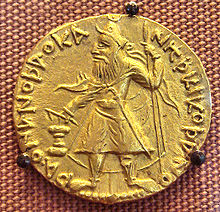Kanishka
| Kanishka I | |
|---|---|
| Kushan king | |

Gold coin of Kanishka. British Museum.
|
|
| Reign | 2nd century |
| Predecessor | Vima Kadphises |
| Successor | Huvishka |
| Born | Peshawar |
| Died | Peshawar |
| Burial | Peshawar, Pakistan |
| House | Kushan Shahs |
| Dynasty | Kushan |
| Religion | Zoroastrianism, later Buddhism |
Kanishka I (Sanskrit: Kaniṣka (कनिष्क); Bactrian: Κανηϸκι, Kaneshki; Middle Chinese: 迦腻色伽 (Ka-ni-sak-ka > New Chinese: Jianisejia)), or Kanishka the Great, was the emperor of the Kushan dynasty in the second century (c. AD 127–150). He is famous for his military, political, and spiritual achievements. A descendant of Kushan empire founder Kujula Kadphises, Kanishka came to rule an empire in Bactria extending from Turfan in the Tarim Basin to Pataliputra on the Gangetic plain. The main capital of his empire was located at Puruṣapura in Gandhara, with two another major capital at Kapisa.
His conquests and patronage of Buddhism played an important role in the development of the Silk Road, and the transmission of Mahayana Buddhism from Gandhara across the Karakoram range to China.
Earlier scholars believed that Kanishka ascended the throne in 78 CE, and that this date was used as the beginning of the Saka calendar era. However, this date is not now regarded as the historical date of Kanishka's accession. Kanishka is estimated to have accessed to the throne in AD 127 by Falk (2001).
Kanishka was a Kushan of probable Yuezhi ethnicity. His native language is unknown. The Rabatak inscription uses a Greek script, to write a language described as Arya (αρια) – most likely a form of Bactrian native to Ariana (an area similar to modern Afghanistan), which was an Eastern Iranian language of the Middle Iranian period. However, this was likely adopted by the Kushans to facilitate communication with local subjects. It is not certain, what language the Kushan elite spoke among themselves. If controversial theories connecting the Kushans and/or Yuezhi to the medieval ("Tocharian") peoples of the Tarim Basin are correct, Kanishka may have spoken a form of – a "centum" Indo-European language. (Whereas Iranian languages such as Bactrian were "satem" languages.)
...
Wikipedia
